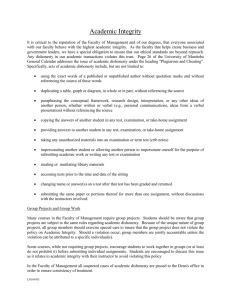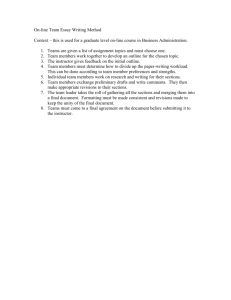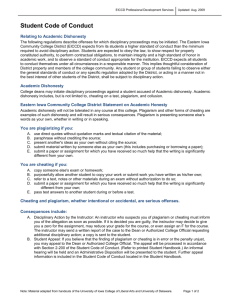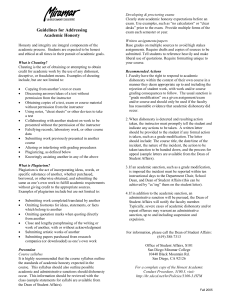DRAFT St. Cloud State University Policy POLICY: Academic TITLE
advertisement
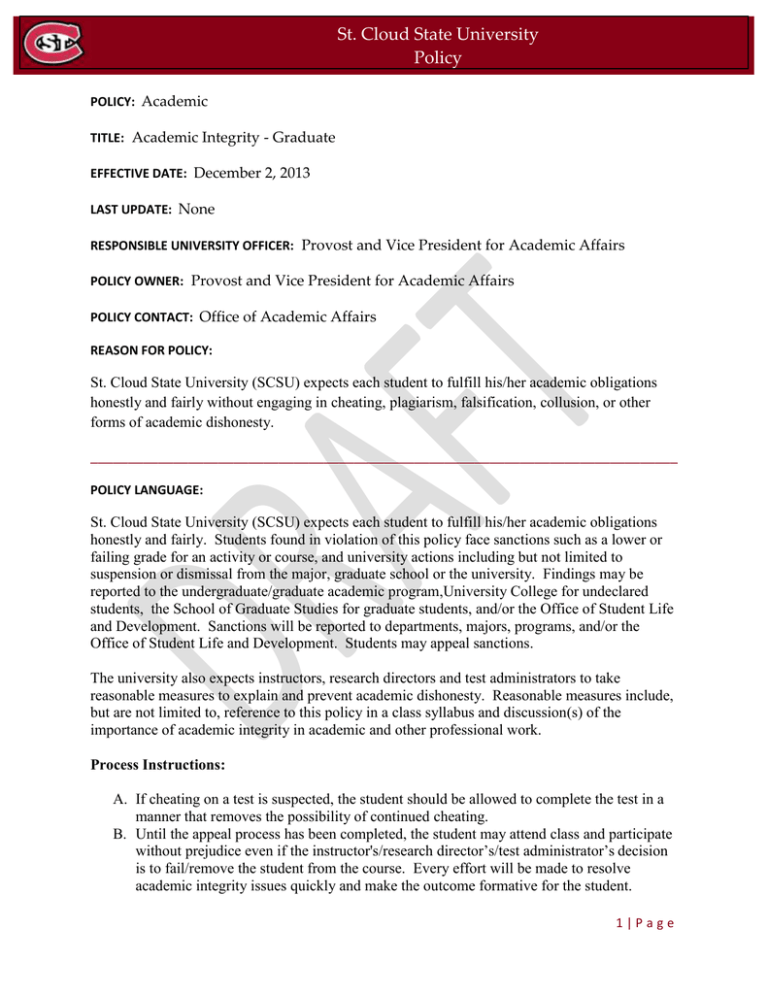
St. Cloud State University Policy POLICY: Academic TITLE: Academic Integrity - Graduate EFFECTIVE DATE: December 2, 2013 LAST UPDATE: None RESPONSIBLE UNIVERSITY OFFICER: Provost and Vice President for Academic Affairs POLICY OWNER: Provost and Vice President for Academic Affairs POLICY CONTACT: Office of Academic Affairs REASON FOR POLICY: St. Cloud State University (SCSU) expects each student to fulfill his/her academic obligations honestly and fairly without engaging in cheating, plagiarism, falsification, collusion, or other forms of academic dishonesty. ______________________________________________________________________________ POLICY LANGUAGE: St. Cloud State University (SCSU) expects each student to fulfill his/her academic obligations honestly and fairly. Students found in violation of this policy face sanctions such as a lower or failing grade for an activity or course, and university actions including but not limited to suspension or dismissal from the major, graduate school or the university. Findings may be reported to the undergraduate/graduate academic program,University College for undeclared students, the School of Graduate Studies for graduate students, and/or the Office of Student Life and Development. Sanctions will be reported to departments, majors, programs, and/or the Office of Student Life and Development. Students may appeal sanctions. The university also expects instructors, research directors and test administrators to take reasonable measures to explain and prevent academic dishonesty. Reasonable measures include, but are not limited to, reference to this policy in a class syllabus and discussion(s) of the importance of academic integrity in academic and other professional work. Process Instructions: A. If cheating on a test is suspected, the student should be allowed to complete the test in a manner that removes the possibility of continued cheating. B. Until the appeal process has been completed, the student may attend class and participate without prejudice even if the instructor's/research director’s/test administrator’s decision is to fail/remove the student from the course. Every effort will be made to resolve academic integrity issues quickly and make the outcome formative for the student. 1|Page St. Cloud State University Policy During the appeal process, the student may register for the next course in a sequence of courses, if applicable. However, if the appeal fails, the student can be removed from the more advanced class by his/her program or major. C. Where possible, electronic communication (e.g., conference phone call, Skype, Adobe Connect, etc.) is to be used to assure the student and faculty member every opportunity to have allegations investigated. If expedited resolution is deemed necessary by the Provost, a duty day can be paid to faculty who are not under contract to meet with a College/School Academic Integrity Committee. Unless the student chooses to appeal, resolution of the academic integrity violation allegation should be within ten (10) duty days. All other procedures and timelines will apply during expedited academic integrity allegations. D. Shorter processing deadlines may be imposed on College/School Academic Integrity Committees and clinical, pre-professional or experiential program students if (a) finding(s)/sanction(s) must be resolved in advance of a subsequent semester or the start of new classes in a sequence of clinical courses. Definitions Definitions of academically dishonest behaviors prohibited by this policy are below. 1. Academic Integrity Violation includes, but is not limited to: A. Cheating, which includes, but is not limited to: a. use of any unauthorized assistance in taking quizzes, tests, or examinations; b. use of resources beyond those authorized by the instructor in writing papers, preparing reports, solving problems, or carrying out other assignments; c. acquisition, without permission, of tests or other academic material belonging to a member of the university faculty or staff; or d. engagement in any behavior specifically prohibited by the instructor in the course syllabus or class discussion. B. Collusion, which includes, but is not limited to: Intentionally or knowingly helping or attempting to help another to commit an act of academic dishonesty. The sale or sharing of academic materials (including one’s own work) by any means to other students without the clear authorization of an instructor, may be considered collusion. C. Fabrication, which includes, but is not limited to: Intentional or unauthorized falsification or invention of any information or citation in an academic exercise or sponsored research activity. D. Plagiarism, which includes, but is not limited to: a. submitting the work of others by direct quote or paraphrasing as one’s own without full and clear acknowledgment; b. submitting the work of others as one’s own with only minor changes; c. submitting the work of others as one’s own without adequate footnotes, quotations, and other reference forms; d. submitting multiple versions of the same work, written or oral, for more than one course without the permission of the instructor of each class; e. making minor revisions on work which has received credit and submitting it again as new work; 2|Page St. Cloud State University Policy 2. 3. 4. 5. 6. 7. f. submitting, without acknowledgement, materials prepared by another person or agency engaged in the selling of term papers or other academic material; g. includes, but is not limited to the use by paraphrase or direct quotation the published or unpublished work of another person without full and clear acknowledgment; unacknowledged use of materials prepared by another person or agency engaged in selling or otherwise providing term papers or other academic materials or sale or distribution of class notes without the instructors’ permission. E. Scientific Misconduct, which includes, but is not limited to: Fabrication of data, falsification of data, inappropriate alterations of approved Institutional Review Board (IRB) thesis and doctoral approved procedures and methodology, inappropriate analysis of data, violation of ethical standards regarding human and animal experimentation, falsification of experimental procedures/methods, and other fraudulent actions. College/School Academic Integrity Committee: Group of individuals assembled within each college/school to review academic integrity violation allegations. Finding, which includes, but is not limited to: Conclusions reached based on interview and data submitted. Formal Mediation Process: http://www.stcloudstate.edu/mediation/ Hearing: A formal, convened meeting for the exchange of data, facts, documents, and opinions. Preponderance of Evidence: is defined as a standard of responsibility that it is more likely than not that the Student Code of Conduct has been violated. Sanction(s), which includes, but is not limited to: Removal of student from course, reduction in grade, etc. 3|Page

